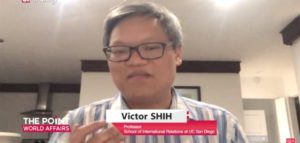
China is taking a short breath from the anti-Covid protests and comes to terms with the effect of the sudden relaxation of the zero-Covid measures. Political analyst Victor Shih takes a step back at KQED and looks at the fallout of the protests in the short term.
KQED:
What do we know about the protests? What’s exceptional about them?
Shih: The scale in terms of the number of people participating is not especially large, but in terms of the geographical spread and also the demands that were voiced by the protesters, really it is something that we have not seen since 1989. These are protests taking place over a dozen cities, and while they mostly call for less COVID restrictions, there are quite a few instances of protesters asking for fundamental political reform. Even at an elite institution like Shanghai University, which has produced half the top leaders of China — including Xi Jinping himself — there were calls for rule of law and freedom. That’s really striking and is something that we have not seen for several decades…
It seems like this zero-COVID approach is causing the Chinese Communist Party and Xi Jinping a lot of trouble. So why not do something else?
Shih: You have to remember that China spent pretty much the past three years trumpeting the successful approach in controlling COVID up until recent months. After the initial wave of very tragic infections and deaths in Wuhan, the Chinese government was able to control the spread of COVID at a time when, in most countries in the world, COVID spread pretty much uncontrollably, leading to millions of deaths.
Up until the end of 2021, we there has been a very low spread of COVID and a very low number of deaths in China. And so the Chinese government made a lot of that fact. For them to suddenly change course and to open up and to allow the sort of rampant spread of COVID, I think that will create another wave of crisis maybe among a different population, among older people, among people who work for the Chinese government and who were at the forefront of trying to enforce the COVID lockdown policies. So I think either way that they go, they will create some kind of problem with some segment of the population.
Xi Jinping’s grip on power in the party is pretty absolute at this point, because he has inserted very trusted followers in the People’s Liberation Army and also in the internal security services. Once you control those two parts of the Chinese government, you pretty much have all the levers of power. So I don’t think that will change. But we have seen some softening of COVID policies because of the protests. And of course, that could be tactical. But the economic costs of COVID lockdown is quite substantial. I think a lot of people around Xi probably are beginning to suggest to him that that COVID policies need to change or the Chinese economy is really not going to be in a good place…
How important is it to have protests of solidarity outside of China, like the recent vigil that was held in Chinatown in San Francisco? Does it have any impact on what’s happening in China?
Shih: I think the protests both in China and also overseas are having a very enormous medium-term impact. In the literature on protests, one of the deepest insights, I think, is from Professor Timur Kuran, who’s at Duke University. His insight is that with protests, especially in authoritarian regimes, people who previously have been very isolated from each other, who didn’t know that other people felt the same way, when they showed up on the streets, they all realized that actually there are quite a number of people who feel the same as them.
This is especially true in China, but also true outside of China, where, of course, a lot of people who have been unhappy with the Chinese government have left China and have come especially to the United States. But they didn’t know that there were so many others like them.
So with these protests, they suddenly realized that there’s actually quite a large community of people who are just like them. This “information revelation,” which is what we call it in the literature, will encourage them to participate in further protests.
And, of course, this mechanism will be especially strong overseas where there is not the threat of arrest when you participate in anti-Chinese government protests. So I think this will have a long-lasting impact.
Victor Shih is a speaker at the China Speakers Bureau. Do you need him at your (online) meeting or conference? Do get in touch or fill in our speakers’ request form.
Are you looking for more political experts at the China Speakers Bureau? Do check out this list.
No comments:
Post a Comment